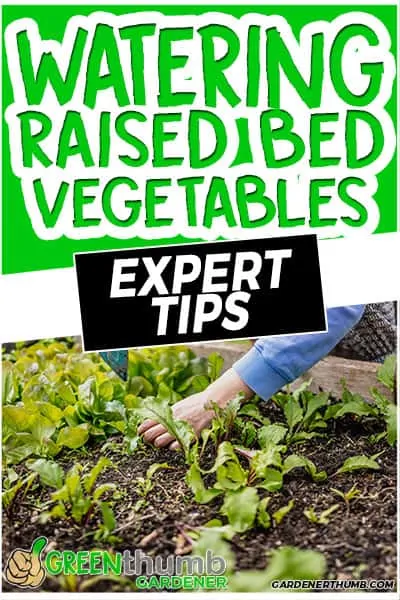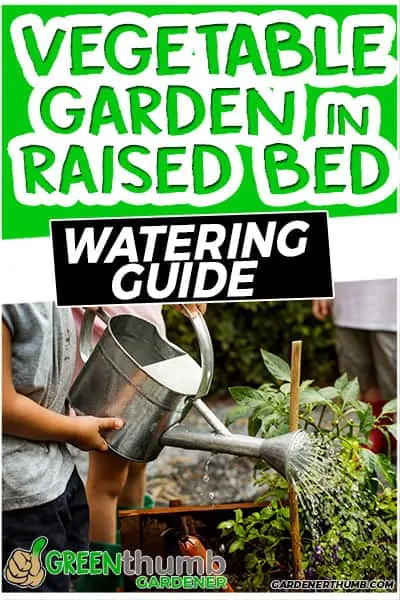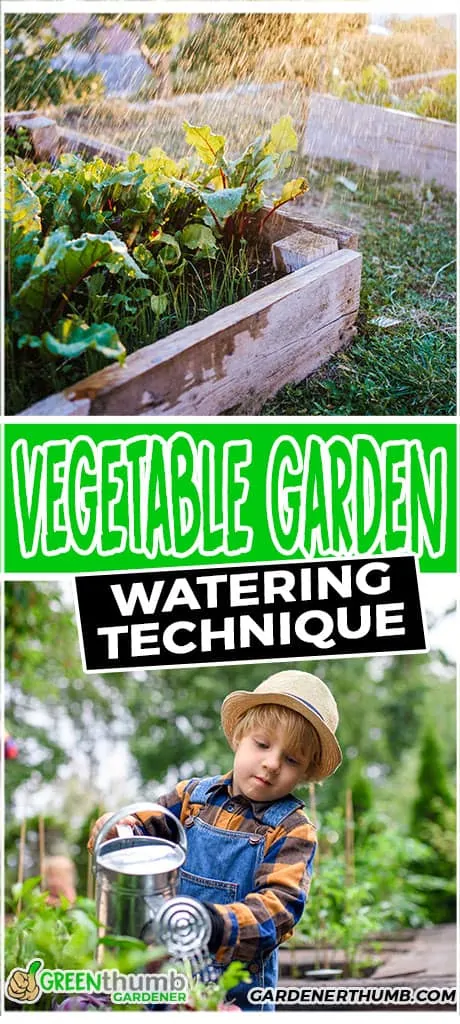How Often To Water Raised Vegetable Garden
Last updated: 9/18/20
Watering is an essential activity in any gardening. In this article, we are going to learn how often to water raised vegetable garden.
If you have had this question, you are not alone. I once dealt with endless issues as a result of wrong watering.
From drowning my vegetables causing rot to wilt as a result of under watering, my efforts were ending up in vain. I knew I had to find a lasting solution.
Let us dig into making things right with your vegetable garden before it is too late.
Green thumb Gardener occasionally links to product and/or services offered by vendors to assist you with all your gardening needs. Some of these may be affiliate links, meaning we earn a small commission if items are purchased.
Want to Download a Garden Hack Guide for FREE

Enter your email below and we will send you a guide to help you SAVE money in your garden.
How Often To Water Your Raised Bed Garden
Raised bed gardening is widely replacing traditional gardening across the world. This is due to their high yields in a limited space and easy management.
A major challenge is how often to water the raised bed. There is no specific rule as to how often to water raised bed.
However, there are a few factors you can check on.
1.| Stage of Your Plants
Plants at the seedling stage require watering daily. Depending on the state of the soil, you may need to water them twice a day.
The seedling stage requires constant moisture. However, be careful not to soak the soil.
You can reduce the watering intensity as the vegetables grow older. You can adjust the watering frequency depending on the need for your vegetables and other factors.
2.| Weather
How often to water your raised garden also depends greatly on your area’s weather and climate.

If your environment experiences hot, dry, and sunny weather, you need to water your garden more often.
On the other hand, if you live in a cold area with regular rain spells, watering your garden less often, like every two or even three weeks, is recommended.
Remember, the availability of moisture in the soil determines the frequency of watering.
3.| Type Of Soil
Check the soil before watering. If the touch is damp or soggy, your garden probably isn’t thirsty yet. If the soil is nearly dry, though, it requires a drink.
However, you should not absolutely leave the ground to dry out.
Another important aspect to check in the soil of your bed is its type. Clay soil holds water more compared to loam and sand soil. Its heavy nature means it holds moisture for long, requiring less watering.
4.| Seasons
Every season comes with different temperatures and amounts of rainfall. In hot weather, the vegetables will require 3 times as much water as in cold weather.
This explains why your plants will need more water in the summers to thrive against the harsh sunshine.
To reduce watering demand in this season, I add some compost and mulch to my garden bed. This reduces evaporation.
5.| Type of Vegetables Grown
Your frequency of watering can greatly vary depending on the type of vegetables in your raised garden. For example, cucumbers may require more moisture as compared to herbs.
New Seedling Plants vs. Establish Plants
There is a significant difference in watering new seedling plants and already established plants.
Watering New Seedling Plants
The new plant will go through a little adjustment process after newly planting it. It will not be as tough as your more mature plants.
Remember, it has not yet developed its root system, so it cannot search for water in the soil.
What Does That Mean?
Offer a little extra attention to these freshly planted seedlings in the first few days; maybe a week or two after planting them in your raised garden.
More and low-pressure watering is required to keep the soil moist.
As a rule of thumb, water the seedlings twice daily in a controlled manner not to drown them. This will enable the young vegetables to quickly grow and establish.
Watering Established Plant
On the other hand, our main aim as we water established plants is to keep the crop healthy and encourage the plants’ deep rooting.
Well-developed root systems are essential in helping your vegetables forage for water in the soil layers.
How can you achieve that?
You can water your plants less frequently but for a longer period. It is recommended to allow water to soak the soil around each crop up to 5 or 6 inches deep.
This will allow the plants’ roots to go deeper into the earth.
Frequent and shallow watering should be avoided. This can cause plant roots to grow shallowly on the soil’s surface.

Know Your Daily Weather Patterns
As early mentioned, the weather is one of the major factors that determine the frequency of watering your raised vegetable garden. There are various ways you should respond to every day’s weather patterns.
Hot Weather
Don’t wait till your vegetables start wilting before you begin watering. Hot weather can cause blossom-end rot, cracked fruits, poor growth, bitter fruits, and other issues if you do not consistently keep the soil moist.
How should you respond to the hot weather?
It would be best if you watered regularly when the temperatures climb higher than 100 degrees Fahrenheit.
Consider watering daily if your area is not getting natural precipitation.
If it does rain a little, ensure you measure the rain’s intensity using a rain gauge to know how much water you should add. The intensity of watering can vary here, depending on the types of plants you cultivate.
In case of extreme heat, you should consider making the mulch thicker, about 3 inches.
Additionally, it would help if you used a drip or soaker hose, setting the nozzles in closer proximity with your plants’ base.
This way, you will achieve deep watering encouraging deep root growth as a result.
Rainy Weather
Rain can be a great water source for your vegetables, but you cannot fully rely on it. I usually use my rain gauge to tell the amount of rainfall at a given time.
This helps me determine and plan well the amount of water I should release to the garden beds. You, too, can always be excited whenever you see black clouds.
But do you know too much rain can be problematic?
What you should do if your garden experiences too much rain
- Turn off the irrigation system. You should immediately stop watering your garden whenever there is heavy rainfall. Excess rain may interfere with the circulation of oxygen.
- Avoid working in the wet garden. this can lead to soil compaction
- You can also aerate the soil to encourage the flow of oxygen and nutrients in the soil.
Summer
This is the hottest season of the year. When it comes to gardening, more watering is required in this season than any other.
How much is more water?
You can tell how much you need to water by determining the temperature. On average, the temperature should read at 60 degrees Fahrenheit.
Your crops will generally require an inch of water per week when the temperature is at this level. For every extra 10 degrees Fahrenheit, you will need to add half an inch of extra watering per week.

Further Reading
How to Water a Raised Bed Garden
Raised bed gardens may need more watering compared to the in-ground watering, especially if the walls of the bed are porous.
You can use several methods, but I prefer drip irrigation because of its significance over other methods.
Using Drip Irrigation
- Tap into the main water line. You can install an anti-siphon to prevent back flow
- Run the tubing through your garden
- Install the irrigation valves at several points as possible
- Close off the end of the tube
- You are ready to let water into your garden
You can also acquire a ready-made drip-line irrigation system such as the Garden In Minute’s grid.
You can easily install it by following the manufacturer’s instructions. You might like it if you have a square-foot raised garden.
7 Tips To Up Your Watering Game
1.| Water Deeply
Apply water twice or thrice a week and ensure to water deeply every time. This can be effective compared to quick, shallow daily watering.
Watering thoroughly moistens the soil up to 6 inches deep, which is ideal for the vegetables to drink enough water. This can also encourage deeper root penetration.
Deep roots allow plants to better withstand stresses from hot and dry weather.
2.| Reduce Water Pressure
Let the water soak slowly into the soil. It doesn’t matter the irrigation method it uses. As long as the method allows water to seep carefully into the soil without eroding topsoil, it is a good method. Consider this aspect more on sloping places, where water appears to drain off before it soaks in.
3.| Water In The Morning
Watering early before the high temperatures of the day will see your vegetables absorb more water before evaporating. It will also give the leaves plenty of time for drying before dark.
Watering in the morning decreases the risk of fungal and other diseases attached to watering late in the evening. If you also water at night, you may put your vegetables at high risk of contracting waterborne diseases and various pests’ attacks.
4.| Keep In Track Of The Amount Of Rainfall In Your Garden
Use a rain gauge to know the amount of rain your raised garden is receiving. As a result, you can tell the amount of water you can add to your garden.
5.| Use Drip Irrigation
Drip irrigation is the best method to apply when you have a problem with the frequency of watering. Position the drip next to the plant to allow water to penetrate the root zone. This method utilizes water on plants preventing the waste of water.
Most drip irrigation kits come with pressure emitters, which allows you to set the rate of water flow. You can easily monitor the amount of water getting into your garden.
This method also leaves the space between rows and walkways dry, which discourages the growth of weeds.
6.| Attend To Your Garden Every Day
You may prefer to use automatic irrigation methods, but it is vital to spend some time in your garden daily. You can use this time to check for moisture in the soil.
You can also spot issues that may arise as a result of improper watering, giving you a chance to mend the problem before it gets worse.
In case you use automatic watering systems, you can program the system to run when you are in your garden. This allows you to spot any problem with the system to avoid over-watering or under-watering.
7.| Don’t Forget To Mulch
We have already talked about the importance of mulching during the hot season. This can be a great way to conserve moisture in the soil.
You can embrace this practice throughout the year to reduce the demand for watering.
Final Thoughts
Watering is essential for plants’ growth. Knowing how often to water raised vegetable gardens will help you avoid the common watering mistakes and losses that come with the errors.
This article gives you an opportunity to stand out in vegetable farming. Change your practices and see green and healthy plants through the growth and development of your vegetables!
Related Questions
1. Can You Over Water A Vegetable Garden?
Yes. But it is recommended to over-water early in the morning for the water droplets to dry out from the leaves with the day’s heat. Over-watering at night may cause fungal disease.
2. Should I Water My Vegetable Garden Every Day?
Not unless the vegetables are newly transplanted to the garden.
3. How Much Water Does A Raised Bed Need?
Generally, the bed will require an inch per week at an average temperature.








